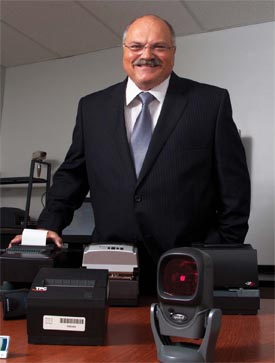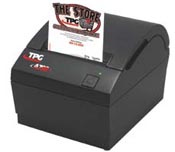Integrate POS & Video Surveillance
By Matt Pillar, Business Solutions magazine
Adding an integrated video surveillance solution to its line card helped fuel 30% growth for a small South Florida POS VAR.

Like trees that sprout faster and grow healthier in the aftermath of a forest fire, seedlings planted by Datatek founder Jim Brown while he battled through the Great Recession are beginning to bear fruit. In 2008, Datatek suffered the steepest drop in sales since Brown founded the business in 1994. Instead of contracting like most VARs did, Brown took a big, albeit calculated risk, by investing in the expansion of his company’s offerings.
The calculated part was key. Brown knew POS system sales would come back around. They simply had to. Pre-recession systems wouldn’t last forever, and many of the small and regional grocers Datatek serves were already limping along with systems that had been pushed well past their anticipated lifecycle. But that waiting game can prove difficult for a fiveman outfit like Datatek to bear. Brown had to offer something his customers would buy even as those customers contracted at the hands of the recession. After much deliberation, he came to three conclusions: two recession-proof and one recession-fueled.
First, Datatek became a ServRight channel partner, which enabled it to offer field-level technical service, network solutions, and repair of grocery equipment outside its traditional POS wheelhouse. Then, the VAR focused on consumables, adding label and signage supplies to its line card. These were the recessionproof initiatives. “These decisions steadied the ship,” says Brown. “The sales we generated by expanding our service offering through ServRight and adding consumables — both of which grocers need in good times and bad — underpinned us while we were running slow in our core areas,” he explains.
The third decision would prove to do more than sustain the company through hard times; it would become a core component of the Datatek solution set as the company powered through the recession, ultimately soaring to 30% growth.
Market Need Serves Up Healthy Margins
Independent grocers are far from immune to economic woes. “As the economy faltered, grocers experienced a well-documented increase in theft and other retail crimes,” explains Brown. “We began fielding more requests for security cameras, so we decided to add an integrated surveillance system to our core POS solution for grocers,” he says. The demand is not unexpected, and it poses a rich opportunity for retail technology integrators. IMS Research projects that 20% growth in the networked video surveillance market will create a $14.4 billion industry by 2014, and the cloud-based video surveillance, or VSaaS (video surveillance as a service) market is expected to double this year.
In response to the demand, Brown chose a camera/ DVR package from i3DVR, knowing well that he’d lose a fair amount of business to competitors with cheaper products. “We tell our customers up front that our surveillance offering isn’t the cheapest, but it’s the best,” says Brown. He advises VARs that seek to sell surveillance solutions to steer clear of inferior technology, regardless of price point. In the long run, he says, the quality of the product will pay dividends in the form of repeat business and customer satisfaction. “We chose i3DVR because they offer a wide range of cameras and lenses to accommodate a variety of indoor and outdoor applications and lighting conditions, and their resolution and integration capabilities are among the best,” he says. Brown says most surveillance systems on the market for independent grocers are so low in quality they prove useless in aiding the identification of thieves, suspect vehicles, or operational issues. Not so, he says, with megapixel cameras and DVRs from i3DVR. The company became an i3DVR-certified reseller in 2010 after completing the vendor’s camera certification program.
While Brown says his company had the internal know-how to install and maintain networked IP video systems (Brown holds degrees in computer science and electrical engineering), Datatek technicians were required by state code to acquire low voltage wiring certification at a cost of $4,500.00 per person.
“The IP cameras we’re installing now allow our customers to get crystal-clear images of whatever they’re monitoring, from people to license plates to POS transactions,” he says. “You can even zoom in and pan recorded video, which is a powerful enabler for our retail customers.” And while they might come with a price tag that scares off some, Datatek makes a healthy margin on the i3DVR sales it makes. While hardware sales margins are suffering across the board, Datatek typically enjoys a 20% profit margin on DVR and camera sales and another 5% on installation and integration.
To date, Datatek has implemented more than 30 i3DVR-based surveillance systems in grocery and other retail verticals, ranging in scope from 8 to 32 cameras per facility.
Integration With POS Drives Sales
Initially, Brown looked no further than his existing customer base in his effort to sell surveillance solutions. “We were immediately able to demonstrate the functionality of the surveillance system through an existing integration with ScanMaster POS from StoreNext,” he says. This integration allows managers to instantly call up and view video of specific transactions to analyze exceptional or flagged transactions for cashier performance, systems issues, or criminal activity. The video can be viewed within the POS software, which displays the actual transaction including items scanned, item price, payment tendered, etc. Megapixel camera technology reveals the slightest details, including the production and issuance of paper receipts from the VAR’s standard CognitiveTPG A776 and A799 receipt printers. Datatek is a CognitiveTPG Preferred Partner, which garners the VAR discounts, relaxed minimum order requirements, and demo equipment, among other benefits. See the sidebar on page 32 for more on Datatek’s partnership with CognitiveTPG.
“Our core POS customers bought into i3DVR because of the pre-canned integration and our retail expertise, giving us an advantage over the pure-play security solution providers with whom we found ourselves competing.” Brown says Datatek’s grocery pedigree helps too. “With our history in grocery POS systems and our expanded IT service offering through ServRight, we can present as a one-phone-call solution for all electronic parts of the store,” he says.
Later, as the company entertained sales calls that gave it the opportunity to lead with surveillance and move those customers into its core POS systems, Brown says an improvised lab in his Sunrise, FL, offices began to serve as customer demonstration grounds. “We have different iterations of cameras mounted every six inches around the office, it seems,” quips Brown. But, a camera-cluttered office environment is a small price to pay for a fast-growth solution set. More than 20% of Datatek’s 2011 sales were driven by surveillance solutions, and Brown says his company is selling video surveillance in more than a quarter of sales engagements this year, a figure he expects will climb. “We’re the primary technology provider for a 15-store grocery chain that was recently victimized by copper thieves who stole tens of thousands of dollars worth of copper tubing from refrigeration units in the dark of night,” says Brown. In addition to the inconvenience and expense associated with equipment repairs, those stores suffered thousands of dollars of loss in the form of spoilage. “The grocer called us the next day and we were installing i3DVR the following week. As the poor economy drives desperation and an increase in criminal activity, it’s also driving a sense of urgency for business owners to protect their premises,” concludes Brown.
Today, Datatek’s core business offering — the sale of POS systems — is creeping its way back to life, not so much fueled as it is prodded by an inability for grocers to keep holding off on store systems upgrades. About 18 months ago, Datatek began selling Market Master POS software, a full-scale (inventory, PO, receiving, label printing, reporting, etc.), low-cost option that runs on virtually any POS hardware. Most Datatek customers can therefore migrate to Market Master without upgrading hardware, significantly minimizing the cost burden associated with a POS upgrade.
As his company gradually returns to its normal course of business, Brown says he intends to maintain the relatively new focuses on service, consumables, and certainly security. Those moves he made to sustain Datatek through the downturn, he says, are paying better-than-anticipated dividends in its wake.

